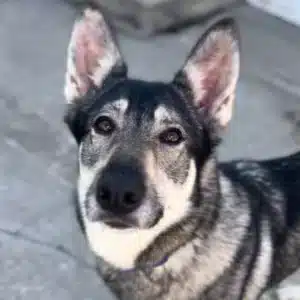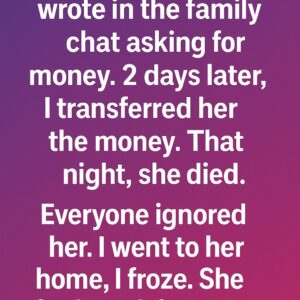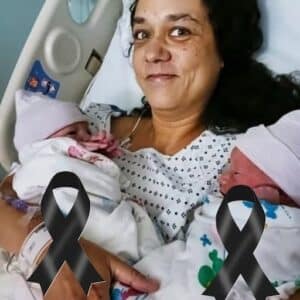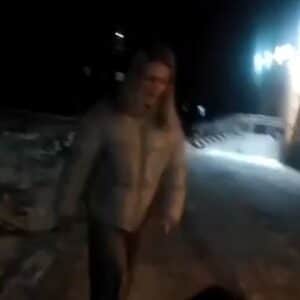Three months ago, I went to bed as a daughter and big sister.
By morning, I was an orphan and a mother.
The night of the fire is mostly flashes in my mind. Heat pressing against my face. Smoke so thick it felt like trying to breathe through wet cloth. The distant roar of flames. Somewhere through the haze, I heard them — Caleb and Liam — screaming for me.
My little brothers. Six years old. My whole world.
I remember grabbing a shirt, wrapping it around the doorknob so I wouldn’t burn my hand. I remember thinking, I have to get to them. I have to get to them.
After that, it’s blank.
According to the firefighters, I pulled them out myself. I carried one, dragged the other, and somehow got us through the kitchen before the ceiling collapsed behind us. I don’t remember any of it.
What I do remember is standing barefoot in the street, wrapped in a blanket, while the house I grew up in burned to the ground. Caleb and Liam were pressed against me on either side, sobbing into my ribs. I kept telling them it was okay, even though nothing was okay.
Our parents were gone. Our home was gone. Everything familiar, warm, and safe — gone in a single night.
From that moment on, they were my responsibility.
If it hadn’t been for Mark, my fiancé, I don’t know how I would’ve held it together.
Mark didn’t just step in; he rooted himself next to us and refused to move. He went to grief counseling with us. He cooked dinner. He picked the twins up and spun them around when they started crying for Mom and Dad. He sat on the floor and built Lego castles and told them, over and over, “You’re safe. We’re not going anywhere.”
They started calling him “Mork” when they first met him, and somehow the nickname stuck. He wore it like a badge of honor.
We talked about adoption pretty early. Not “maybe, someday,” but when the courts let us, we’ll make it official. They were already our boys in every way that mattered.
But there was one person who didn’t see them that way.
Mark’s mother, Joyce.
Joyce had never been subtle about her feelings. Even before the fire, she treated me like I was digging for gold that didn’t exist.
“You’re lucky my son is so generous,” she’d say with a tight smile. “Most men your age don’t want… baggage.”
By baggage, she meant two traumatized children who had just lost everything.
After the fire, her attitude hardened into something uglier. She didn’t yell. She didn’t throw tantrums. She preferred cruelty with a smile.
At family gatherings, she would coo over Mark’s sister’s kids — hugging them, slipping them candy, asking about their teachers — and breeze right past Caleb and Liam like they were part of the furniture.
At one birthday party, she was handing out slices of cake. Every child got one… except my brothers.
“Oops,” she said lightly. “Not enough slices.”
I watched Caleb glance down the table, eyes quickly scanning the plates like he’d miscounted. Liam just looked confused. Thankfully, at six, they still didn’t understand the adult malice behind things. They just thought Grandma Joyce was forgetful.
I pushed my plate toward them. “Here, baby. I’m not hungry.”
Mark did the same. We didn’t need to say anything to each other. The look we exchanged said enough: This isn’t an accident. This is deliberate.
The comments didn’t stop.
“You should be focusing on giving Mark children of his own,” Joyce told me once over Sunday lunch, swirling her wine. “Not wasting your best years on… charity.”
“We’re adopting my brothers,” I said evenly. “They are our children.”
She waved a hand, like I’d said something foolish. “Legal papers don’t change blood,” she replied. “You’ll understand one day.”
Mark set his fork down with more force than necessary. “Mom, that’s enough. You don’t get to talk about them like that. They’re kids. And they’re our kids. Respect them or keep your opinions to yourself.”
Joyce laughed, then did what she always does when she’s called out: played the victim.
“I can’t say anything in this family,” she huffed, gathering her purse. “Everyone attacks me for telling the truth.”
She stormed out, letting the front door slam behind her.
I should have known she wouldn’t stop there.
I had to travel for work for the first time since the fire — just two nights. Mark took time off and stayed with the boys. We FaceTimed before bed, and everything seemed fine.
The trouble began while I was gone.
When I walked back into the house two days later, still dragging my suitcase, Caleb and Liam ran at me so hard they nearly knocked me over. They were sobbing — not the tired, whiny kind of crying kids do when they’ve skipped a nap, but frantic, panicked crying.
“Hey, hey, what’s wrong?” I dropped to my knees, hugging them tightly. “What happened?”
They both tried to talk at once, hiccuping and gasping until the words tangled. I held their faces in my hands.
“One at a time. Big breath. Start from the beginning.”
It took a few minutes, but the story came out.
While Mark was cooking dinner the night before, Joyce had shown up “for a visit.” She came bearing gifts — two small suitcases. A bright blue one for Liam. A green one for Caleb.
“She said, ‘Look what I brought you!’” Liam choked out. “She told us to open them.”
Inside, she had neatly packed clothes in their sizes, toothbrushes, underwear, small toys, little notebooks. It looked like luggage for a trip.
Except it wasn’t a trip.
“These are for when you move to your new family,” she had told them, smiling. “You won’t be staying here much longer, so start thinking about what else you want to pack.”
My brothers stared at her, confused. “New family?” Caleb had asked. “We don’t want a new family. We want Sissy and Mork.”
“She said you only take care of us ’cause you feel guilty,” Liam whispered, his lip trembling. “She said we don’t belong here. That Mork needs his real children, and we’re just… in the way.”
Then she left.
She dropped that bomb on two grieving six-year-olds and walked out of the house while they cried.
By the time Mark realized what had happened, the boys were inconsolable. He calmed them down as best he could, but nothing stuck. They barely slept.
“Please don’t send us away,” Caleb sobbed into my shoulder. “We’ll be good. We promise. We just want to stay with you.”
My heart broke and boiled at the same time.
“I don’t care what anyone says,” I told them, holding them tighter. “You are not going anywhere. This is your home. Forever. Do you hear me? Forever.”
That night, when they were finally asleep, I told Mark what they’d said. He called Joyce immediately, put her on speaker.
At first, she denied it. Then, when Mark wouldn’t let up, she retreated into that same warped righteous logic.
“I was preparing them for reality,” she said. “They don’t belong there. You can’t carry them forever. Sooner or later, you’ll want your own life back, your own family. Better that they understand early than be shocked later.”
“You’re talking about two six-year-old boys,” Mark replied, voice icy. “Two kids who watched their parents die. You think terrorizing them is ‘preparing them’? You’re sick.”
She scoffed. “You’ll thank me later.”
That was the moment something in both of us snapped.
No more chances. No more excuses. No more letting things slide because “that’s just how she is.”
We decided she needed to see, plainly and undeniably, what kind of person she had chosen to be.
Mark’s birthday was coming up. We knew she’d show up if we dangled even the smallest chance to be in the spotlight. So we invited her over for a “special dinner.” We told her we had “something important to tell her about the boys.”
She arrived right on time, as expected, wearing what I can only describe as her “best martyr face.”
“Happy birthday, darling!” she sang, kissing Mark on the cheek and walking in like she owned the place. Her eyes flicked down the hall toward the twins’ room, as if checking that they were out of her way.
We’d already set the boys up with a movie and a big bowl of popcorn in their room. They knew something serious was happening in the dining room and that they didn’t need to hear it.
We ate. We made small talk. Joyce kept steering the conversation toward “plans for the future” and “how different things will be once you start your own family.”
When the plates were cleared, Mark poured coffee. I stood beside him. He squeezed my hand discreetly.
Showtime.
“Joyce,” I said, letting my voice waver just a bit, “we wanted you here because we have… big news.”
She leaned in, eyes bright.
“We’ve decided,” I continued, “it’s time to… let the boys go. To let them live with another family.”
Her reaction was instant — and ugly.
Relief washed over her face in a way that physically turned my stomach. Her whole posture relaxed. A smile spread slowly like oil across water.
“I knew you’d come to your senses,” she said, almost breathless with satisfaction. “This is the right decision. You are doing the right thing for Mark, finally.”
She didn’t ask where the boys were supposedly going. She didn’t ask if they were okay. She didn’t ask how we’d break it to them.
She just basked in what she thought was a win.
That was all we needed to see.
Mark straightened.
“There is one small detail, Mom,” he said, voice now completely calm and flat.
Joyce’s smile faded a fraction. “What detail?”
“The detail,” he said, “is that the boys aren’t going anywhere.”
Confusion flickered across her face. “What? But you just said—”
“I said what you wanted to hear,” I cut in. “And you showed us exactly who you are.”
Mark reached under the table and lifted two very familiar objects onto it.
The blue suitcase. The green suitcase.
Joyce went pale.
“You brought these into our home and used them to convince two little boys that they were being shipped off like unwanted packages,” Mark said, eyes locked on hers. “You packed their clothes and their toys and told them they were just waiting for new parents.”
“I— I was just—”
“Just what?” I asked. “Just traumatizing them? Just making them believe they weren’t wanted? Just poisoning the only stable home they have left?”
She looked between us, now genuinely rattled. “You’re twisting my words. I was trying to help—”
“No,” Mark said quietly. “You were trying to erase them.”
He set an envelope next to the suitcases. “In there is a letter stating you are no longer welcome around them. We’ve removed you from all school forms and emergency contacts. You will not see them unless and until we decide it’s safe — and frankly, I don’t see that happening anytime soon.”
“You can’t be serious,” she whispered. “I’m your mother.”
“And I am their father now,” Mark replied. “I choose them. Every time. You chose cruelty. This is the result.”
For once, she didn’t have a comeback. She stared at us with a mixture of shock and outrage, then pushed her chair back so fast it scraped the floor.
“You’ll regret this,” she spat, grabbing her purse. “When those boys ruin your life—”
I stood too, something hard and cold settling in my chest. “They’re not ruining our lives. They are our lives. And if you can’t love them, the least you can do is stay out of the way.”
She stormed out, slamming the door.
A moment later, two small faces peeked out from down the hall.
“Is Grandma mad?” Liam whispered.
Mark knelt down and opened his arms. “She is. And that’s okay. She doesn’t live here. She doesn’t make the rules.”
Caleb ran into him first, then Liam. They practically launched themselves at me too, like they suddenly needed to make sure we were really still there.
“You’re staying with us,” I told them, kissing the tops of their heads. “No one is taking you away. Ever.”
“Forever?” Caleb asked, muffled in my shoulder.
“Forever and ever,” Mark said firmly.
The next day, Joyce tried to come by. Mark met her in the driveway and told her to leave. That afternoon, we filed for a restraining order and made it formal. We blocked her number. We warned the school not to release the boys to anyone but us and my mom.
Life didn’t magically become easy after that. Grief is still there, heavy some days, quieter on others. The boys still wake up from nightmares. I still sometimes wake up thinking I smell smoke.
But one huge, constant source of anxiety is gone.
Mark started referring to Caleb and Liam as “our sons” to everyone — no qualifiers, no explanations. He took them to pick out new suitcases, not as symbols of fear, but for something better: our first trip together to the coast.
In a week, the adoption paperwork will be filed.
We lost our parents in a fire. We nearly lost our sense of safety to one bitter woman. But we didn’t.
We built something new instead.
Most nights, when I tuck the boys in, they still ask the same question in small, cautious voices:
“We’re staying, right? With you and Mork?”
And every time, I answer the same way:
“You’re ours. We’re yours. And nobody is ever taking that away.”
Some people think blood is what makes a family.
I’ve seen what blood can do. I’ve also seen what love can do.
If I had to choose?
I’d choose the love that runs toward the fire and carries two terrified boys out into the night — every single time.





